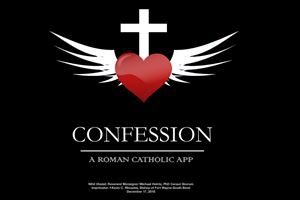
Mobile app helps Catholics prepare to make Confession
Tool called no substitute for sacrament
12/30/2011
To use the app, a person signs on for a personalized program that starts with an examination of conscience. Also included is a step-by-step guide for what to do in the confessional.
Patrick Leinen is a self-described "computer nerd" who was looking for a mobile app that builds up his Catholic faith.
He didn't find much that he liked, so he decided to create his own, Confession: A Roman Catholic App, the purpose of which is described as offering "Catholics everywhere a way to help prepare their hearts to celebrate this sacred Catholic tradition."
It is a tool to help people get ready for Confession, not to take the place of the sacrament, he said in a recent interview.
Mr. Leinen, 31, whose day job is network administrator in Fort Wayne, Ind., said he and his older brother, Chip, and a mutual friend, Ryan Kreager, are technology experts and devout Catholics who began with the goal of building an app just for the fun and the challenge of it.
After some preliminary research, they chose to add a spiritual angle.
"The app store is filled with lots of stuff that appeals to people of my generation -- lots of games, entertainment, kind of fluffy stuff out there," Mr. Leinen said. "But the three of us said, 'Let's see what's out there for Catholic apps,' and there was nothing great out there."
Confession was reported to be the first mobile app to receive the Catholic Church's imprimatur, which was given by Bishop Kevin Rhoades of the Fort Wayne Diocese.
"We took all the code, and all the text, printed in Word format, and submitted it," Mr. Leinen said. "The bishop looked it over and gave us the imprimatur. The Latin text is nihil obstat, or 'nothing stands in the way,' " Mr. Leinen explained. "It caused a lot of confusion. Some people said the Pope approves it. Technically that's not true. Some said the Pope condemns it, and that's not true either."
An imprimatur is a declaration that there is nothing contrary to Catholic teaching that would prevent it from being published.
To use the app, a person signs on for a personalized Confession program that starts with an examination of conscience.
Next is a step-by-step guide for what to do in the confessional.
The third and final part of the program is to record any penance or absolution given by the priest.
Both the creators of Confession and Catholic officials emphasize that the app is only a guide, not a substitute for the actual sacrament.
"This is an aid to confession and in no way, shape, or form a replacement," Mr. Leinen said.
Vatican spokesman Federico Lombardi told reporters last year that the sacrament of penance "requires the personal dialogue between the penitent and the confessor and the absolution by the confessor. This cannot in any way be substituted by a technology application. One cannot talk in any way about a 'confession via iPhone.' "
Released Jan. 27, Confession initially received coverage in the Catholic media, but by Ash Wednesday, March 8, it had become a hot commodity.
"It was really, really different. People didn't know what it was," Mr. Leinen said. "We ended up getting a lot of press. We thought some youth groups would be interested in it, but we didn't expect anything like what happened."
As of earlier this month, Confession has been downloaded nearly 100,000 times, he said. It costs $1.99 per download.
The Rev. Jeffrey McBeth, pastor of St. Thomas Aquinas and Good Shepherd Catholic parishes, said that guides to Confession are nothing new; it's just the format that has changed.
"It may be just a different context to be available on a mobile app, but there are plenty of guides online and in print that have been out there for years," Father McBeth said.
He said a cell-phone app "can be useful, especially for those for whom their smart phone is a tool for so many other things. Having it on there can only help and not hurt."
Father McBeth, 33, said that when he travels he likes to use a mobile app as a guide to pray the Liturgy of the Hours, and that there are apps for the Stations of the Cross, Catholic devotions, and a Web site that helps traveling Catholics find the nearest Mass.
So far, no penitent has pulled out a cell phone in the confessional while Father McBeth was performing the sacrament.
"Not yet, but I would glad to see that if it helps them be more thorough," he said.
Mr. Leinen said his company, Little i Apps, has created a series of other Catholic apps, from devotions to the saints to a Catholic voter's guide that includes blogs, links, and contact information for local elected officials.
The company is presently developing a complex mobile app for college admissions, requiring more than 10 times the normal amount of computer coding for an app, Mr. Leinen said.
Douglas Henry, a professor at Baylor University, warned that spiritual apps can become distractions.
"Living in a world of perpetual mobile connectivity can be spiritually distracting, and even deforming, for those who succumb to its inducements," Mr. Henry wrote in Baylor's Christian Reflection publication. "Whatever technology's wizardry does for us, it cannot fundamentally alter our heart's desire to love God and to love others in God."